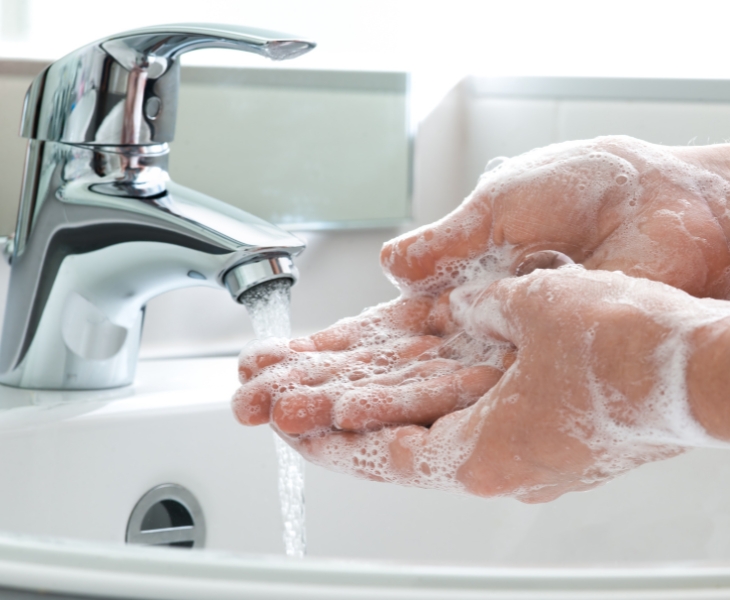Do you wash your hands after every bathroom visit? Do your colleagues? Do your students know how to scrub their fingernails after playing in the dirt at lunchtime? And what about the elderly or incapacitated who don’t have the physical capacity for personal hygiene?
Even in developed countries, the severity of infections from poor hand washing compliance still accounts for up to 10% of hospital admissions, and around 200 deaths per day are attributed to hand-spread contamination.
With those very real statistics, it’s important that people follow WHO Hand Hygiene Guidelines in order to minimise infection spread by unclean hands. This is such a big deal that Global Handwashing Day this October is dedicated to increasing awareness and understanding about proper handwashing.
Healthcare
While something as innocent as taking a pulse or blood pressure reading may not be as likely to contaminate as open wounds, but microbes have a surprising ability to survive for hours on the hands if not cleaned off.
Hand hygiene is critical in the healthcare industry to prevent the spread of healthcare-associated infections (HAIs). HAIs affect approximately 200,000 Australians each year, according to the Australian Commission on Safety and Quality in Health Care, and can result in significant morbidity, mortality, and healthcare costs. Practising good hand hygiene can prevent up to 50% of avoidable infections acquired during health care delivery, including those affecting the health workforce. The National Hand Hygiene Initiative (NHHI) reported 83.9% hand hygiene compliance among Australian healthcare workers in 2020, an increase from the previous year.
According to Hand Hygiene Australia, the national compliance rate for hand hygiene in healthcare sits at around 85.7%. This means that nearly 15% of healthcare workers are not fully complying with hand hygiene standards – even in surgical situations. Given the increased exposure to biological hazards in the healthcare industry, proper handwashing compliance is hugely important.
In healthcare it’s useful to have other options for avoiding contamination, such as prevention of skin tears. In aged care, skin tears are a common issue given the natural tendency for skin to thin and become more fragile as people age. A proper skincare regime that includes pH-balanced cleansing and moisturising can significantly reduce the frequency of skin tears. This also means a reduction in nursing time, wound dressing, and waste disposal, along with less chance of transferring bacteria between open wounds and hands.
Another common issue in healthcare is the high incidence of contact dermatitis. Up to 50% of nurses are affected by this, some of which can be caused by hand cleansers and gloves intended to protect the hands. A hand sanitiser or low-allergy cleanser may be a suitable alternative in these instances.
Childcare
When one child gets sick, so does every child. Such is the bane of childcare, where germs are readily spread between kids and staff via grubby hands. Children in childcare settings are at higher risk of infections, and hand hygiene can help reduce the spread of germs. According to the Australian Government’s Department of Health, around 1.1 million children aged 0-12 years attend some form of childcare in Australia.
On the one hand, germs have been shown to be beneficial for children’s developing immune systems, with early exposure offering long-term protection against some health conditions. There are some studies that suggest sterilising our environment can lead to children’s immune systems becoming hypersensitised, leading to the higher frequency of asthma, eczema, and food allergies.
On the other hand, some germs are downright nasty. Nobody wants to deal with the fallout of a faecally transmitted infection, even if the studies show early exposure can be a good thing. Experts in children’s health suggest that establishing a healthy handwashing routine with soap and water is as effective as antibacterial sanitisers, and much better for their long-term health.
Office
Some people are in too much of rush to stop and wash their hands, do you make time to properly wash your hands? Running your hands for a fraction of a moment under the running water isn’t enough to properly clean them – especially when you don’t know who’s touched the cubicle handles before you, or where their hands have been.
It only takes one person to spread around a flu, cold or gastric illness. By sharing information on proper hand washing and holding everyone accountable, infections in the office can be drastically reduced. Personal sanitisers can also help to destroy bacteria in cases where hands haven’t met properly with soap and water.
Outdoor Industries
This broad title covers a range of jobs such as agriculture, construction, mining or landscaping. While daily activities vary between roles, the same principals apply for maintaining hygiene. Wherever someone is exposed to dirt, dust, grime, or biological hazards, the risk of infection increases. Add open wounds and grazes to the mix and the risk grows even higher.
If you wash your hands regularly it should be enough to prevent the spread of bacteria and other germs, however, access to water isn’t always so convenient. In many cases, industries tend to focus on serious occupational health hazards such as asbestos or silica exposure. Access to a hand sanitiser may be enough to protect against the spread of germs, especially in areas where water isn’t readily available.
Hospitality & Retail
The Australian Institute of Food Safety estimates that 5.4 million cases of foodborne illness occur in Australia each year, resulting in 120 deaths. Foodborne illnesses are frequently caused by poor hand hygiene. Dealing directly with food and cash means regular exposure to particularly undesirable pathogens and other substances. According to one study, many of the organisms found on Australian money are antibiotic resistant, along with evidence of salmonella.
Then there’s handshakes, knife injuries, and all the objects that are mutually handled, where germs are shed from one set of hands and transferred to another. It’s impossible to control other people’s hygiene standards, but ensuring you and your team wash your hands and are protected with proper handwashing procedures can help a lot.
For the sake of those dining or shopping and those providing customer service, access to antibacterial soap and good handwashing education is paramount to disease prevention.
No products were found with the applied settings

